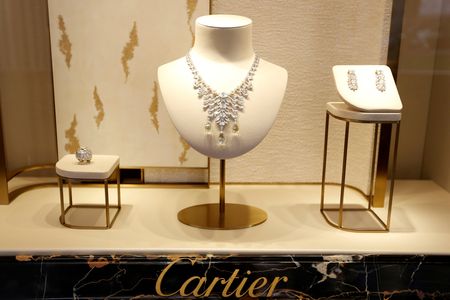By Paul Sandle and John Revill
LONDON/ZURICH (Reuters) – Burberry said it was optimistic consumers in China would start spending again and Richemont saw a rebound there before the holiday, helping offset three years of upheaval from the government’s strict COVID-19 lockdowns and soaring infections.
Britain’s Burberry, famous for its iconic Mackintosh-style coats, said it was seeing “very promising” signs of recovery in China as COVID-19 restrictions eased and a spike in the virus that caused a sharp slowdown in growth before Christmas started to recede.
“We’re very positive about the early signs and confident in the long-term opportunity” in China, said Chief Financial Officer Julie Brown.
She cautioned though the timing and pace of recovery would likely remain unpredictable.
Richemont, whose brands include Cartier jewellery and Swiss watches IWC and Jaeger-LeCoultre, said it had experienced a strong retail recovery recently in China.
Following the peak of the recent COVID wave in major cities, “stores have reopened and traffic has come back, and we are experiencing a strong retail rebound pre-Chinese New Year”, a Richemont spokesperson said.
Its shares were up 1.4%, after hitting their highest in a year while Burberry rose 2.5% to their best level since January 2020 at 1238 GMT.
Luxury rivals LVMH, Europe’s most valuable listed company worth about 400 billion euros ($433.12 billion), Gucci-owner Kering and Swatch are due to report their figures in the coming weeks.
“The Chinese may embrace the same YOLO (you only live once) attitude western consumers have adopted, and they will be able to travel again and find cheaper prices in Europe,” said Bernstein analyst Luca Solca.
“This will create a growth relay, where Chinese consumers take the luxury-spend growth torch from western consumers, as these moderate their spend growth, sobering up from the past pandemic euphoria.”
The luxury industry has in recent quarters benefitted from a strong rebound in regions outside of China, fuelled by pent-up demand from shoppers drawing on savings during lockdowns in their regions.
The resumption of travel has also fuelled growth, with Americans flocking to Europe in particular, taking advantage of the dollar’s strength to splash out on luxury goods.
The European luxury sector is among the largest expected winners as China loosens COVID-19 restrictions that kept shoppers out of stores for months.
CHINA PAIN
But it’s been a tough few years.
Luxury spending by Chinese nationals had dipped from 33% of the global personal luxury goods market in 2019 to as little as 17% last year, according to estimates from Bain.
There’s likely to be a strong rebound from Chinese consumers, after sales decelerated in the third quarter, as they were able to save money during the lockdowns, said Jean-Philippe Bertschy, analyst with Vontobel.
Wednesday’s numbers highlighted the pain inflicted by China’s lockdowns and sudden exit from its zero-COVID policy, which has spurred a surge of infections in the world’s second-largest economy.
Richemont missed market estimates after sales in China plunged by a quarter, as customer traffic dwindled and staff were not available, leading to a reduction of boutique hours, or temporary closures of sales points, the company said.
China accounts for about a fifth of the group’s sales according to Zuercher Kantonalbank estimates.
Burberry’s like-for-like sales growth slowed sharply to 1% in the quarter to end-December after a 23% fall in mainland China, its biggest market before the pandemic, largely offset higher spending by U.S. tourists and locals in Europe.
Mainland China is currently 25% of Burberry sales, down from about 40% pre-pandemic.
($1 = 0.9235 euros)
(This Jan. 18 story has been corrected in the first and the fifth paragraph to show that Richemont did not give a projection for its performance)
(Reporting by John Revill, Paul Sandle and Mimosa Spencer; writing by Mimosa Spencer. Editing by Josephine Mason and Sharon Singleton)

